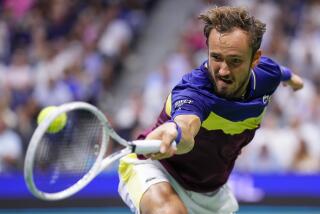TENNIS : Kafelnikov Lets You Know He’s Full of Swagger
- Share via
NEW YORK — Russian Yevgeny Kafelnikov, 25 years old, is at the swagger stage of his tennis career. It’s something many tennis players go through, especially the men.
Andre Agassi is 29 and he has outgrown it. Justin Gimelstob is 22 and he’s still working on his.
Jim Courier had one and it usually came off more as a chip on his shoulder than a swagger. Pete Sampras always seemed to be above such things, and Michael Chang’s game always has been too blue collar to have one. Sweating and swaggering aren’t compatible.
Kafelnikov, somewhat remade in the last year by the coaching of Larry Stefanki of La Quinta, walked the walk through a 6-1, 6-4, 6-4 victory over former world No. 4 Jonas Bjorkman of Sweden. Then, in a session with the media, Kafelnikov talked the talk.
“To be honest, only three guys can win this U.S. Open: Krajicek, myself and Agassi,” Kafelnikov said, shortly before admonishing a reporter for wearing sunglasses during the interview session.
All three are in the bottom half of the draw, so what Kafelnikov was saying, in effect, was that the top half of the draw vacated by the injured Pete Sampras and Patrick Rafter, seeded Nos. 1 and 4, merely existed now to provide an opponent for Krajicek, Agassi or him in the final.
The highest remaining seeded players in the top half are Gustavo Kuerten of Brazil at No. 5 and Todd Martin of the United States at No. 7.
Kafelnikov, No. 3 in the world, and Agassi, No. 2, are seeded to those numbers; Krajicek, of the Netherlands, is seeded No. 12.
“Those are the real guys who can win the U.S. Open,” Kafelnikov said. “Nobody else.”
Kafelnikov was reminded that, while he beat Bjorkman in straight sets, he held a 5-1 lead in the third set before finally getting the job done on his sixth match point while serving at 5-4. No problem, Kafelnikov said. He just swaggered out of trouble.
“No struggle at all,” he said. “I knew I was going to close out the match in three straight sets. It didn’t matter where it would be, either 6-4 or 7-5.”
Stefanki takes a bit of the cocksureness out of his player’s personality when he describes him.
“He’s outgoing, has fun with everybody in the locker room,” Stefanki said. “He’d give you the shirt off his back. He doesn’t have a lot of friends, but he is fiercely loyal to those closest to him.”
Stefanki also said he likes the heavy dose of confidence Kafelnikov carries.
“He think’s he’s going to do well here, maybe going to win,” Stefanki said, “and I really like that. I’m having the time of my life, working with this kid.”
Tommy Tucker of Mission Hills, the head pro at that Palm Springs-area country club, worked with Richey Reneberg until he was ousted by Martin and is also providing moral support for his friend, Stefanki. He told a story that nicely describes the self-esteem difference between Kafelnikov and many others.
“We were out on the practice courts the other day, and Richey and Yevgeny were hitting,” Tucker said. “They both were hitting the ball about as well as it can be hit, and Yevgeny was showing Richey his new strings. He told Richey, ‘With these strings, I am the best player in the world.’ Later, somebody remarked how well Richey was playing, and he said, ‘Yeah, I can be pretty good in practice.’
“That’s the difference, right there.”
Kafelnikov started the year by winning his second Grand Slam title--to go with his 1996 French Open win--at the Australian Open. But in the months following, he went up and down and, though he gained the No. 1 spot for a short time, muffed a couple of other opportunities to get to the top and stay longer.
Stefanki said it was a semifinal match against Agassi in Montreal in early August that convinced him Kafelnikov was ready for a run at the U.S. Open title.
“It was just unbelievable tennis, something like 6-4, 6-1 over Andre,” Stefanki said. “I don’t know if he can play any better than that, but he’s shown some signs here that he can.
“I saw Andre in the locker room afterward, and he said the match had been pretty much of a wake-up call for him.”
The road to get to Agassi will not be easy. Kafelnikov’s round-of-16 match will be against Andrei Medvedev, a winner in five sets over Lleyton Hewitt of Australia. Medvedev, another Russian, lost this year’s French final to Agassi and declared, “I’m back.”
That would be followed by a quarterfinal match against Krajicek (assuming he also gets that far), a former Wimbledon champion and the kind of big server that gives a baseliner such as Kafelnikov trouble.
That kind of competition can turn anybody’s swagger into a limp.
If Kafelnikov gets through that, and form holds, he will face Agassi in the semifinals. At that point, even he knows that survival, rather than swagger, is the preference.
“If we both go to the semifinal, and I’m sure we’re going,” Kafelnikov said, “I’m going to give out more than I have in my body.”
More to Read
Go beyond the scoreboard
Get the latest on L.A.'s teams in the daily Sports Report newsletter.
You may occasionally receive promotional content from the Los Angeles Times.











